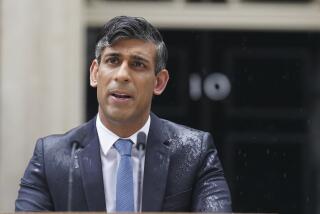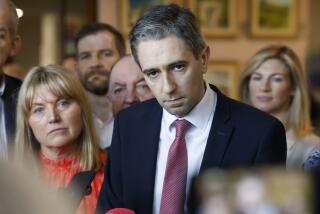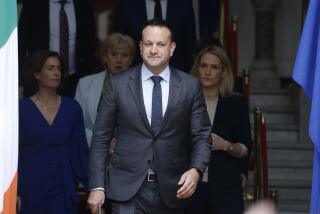Irish Premier Schedules Election After Setback : Politics: Defeat on confidence vote brings down Reynolds’ coalition government. Balloting to be Nov. 26.
LONDON — Irish Prime Minister Albert Reynolds lost a parliamentary vote of confidence in Dublin on Thursday and immediately called a general election for Nov. 26--the same day the government plans a national referendum on changing Ireland’s constitutional ban on abortion.
Reynolds’ conservative Fianna Fail party government was defeated, 88 to 77, after a daylong debate in the 166-seat Dail, the lower house of the Irish Parliament.
The government fell after an acrimonious argument with the Progressive Democrats, its junior partners in the ruling coalition; they walked out on Reynolds on Wednesday and joined the opposition no-confidence vote Thursday.
The timing of the election could not be worse, admitted Reynolds, who became prime minister last February after a bitter intraparty fight that ended with the ouster of longtime leader Charles Haughey.
Thursday’s government crisis occurred against a backdrop of continuing, serious problems confronting Ireland, where unemployment has soared to record highs even as interest rates have been increased to defend the Irish pound during the European currency turmoil. Meantime, the government also has been preparing a budget for presentation in January and is deeply involved in delicate peace talks over Northern Ireland.
An election now, with so many other issues at hand, is “of no benefit to the country on any count,” said Reynolds, 60.
The government crisis began last week when Reynolds accused Des O’Malley, the Progressive Democrat leader and minister of industry in the government, of giving “reckless, irresponsible and dishonest” evidence earlier this year to a parliamentary inquiry into the nation’s beef industry.
O’Malley had criticized Reynolds’ activities as minister of industry in 1987 and 1988 in approving beef sales to Iraq, which O’Malley said exposed taxpayers to unnecessary risks. The Progressive Democrats insisted that Reynolds withdraw his remarks. But he refused, precipitating Thursday’s split in the ruling coalition.
Some members of Fianna Fail have questioned Reynolds’ judgment in driving the O’Malley forces out of the government and forcing elections that could cost the party seats. If Fianna Fail fares badly in the elections in three weeks, Irish political sources say, Reynolds himself could be deposed as leader by the party.
In the past few days, other opposition parties--Fine Gael and Labor--ruled out the possibility of joining a coalition with Fianna Fail as long as Reynolds remains prime minister. Labor is reluctant to join a coalition with Fine Gael because of its unsatisfactory experiences in similar relationships; putting together a majority government with such warring factions after the election may prove difficult.
Opinion polls show that Fianna Fail will have trouble garnering an absolute majority, despite Reynolds’ earlier claim that he would lead the party to victory in a new election.
As for the abortion referendum, the Roman Catholic Church, which is highly influential in Ireland, made clear Thursday its disapproval of the wording chosen by the government for the ballot issue; the government terms would permit abortions in cases in which the life of an expectant mother is at risk.
Ireland’s anti-abortion movement, meantime, said it will not field anti-abortion candidates in the election but urged voters to “consider the attitudes” of those running for office.
The abortion referendum was prompted, in part, by a case earlier this year in which a young girl who asserted that she had been raped sought permission to have an abortion in London.
More to Read
Sign up for Essential California
The most important California stories and recommendations in your inbox every morning.
You may occasionally receive promotional content from the Los Angeles Times.










